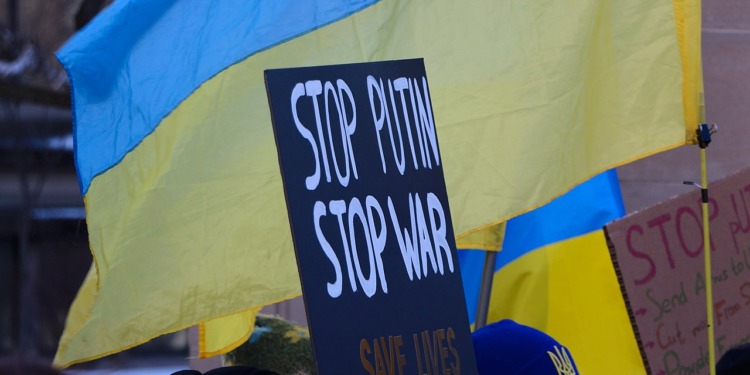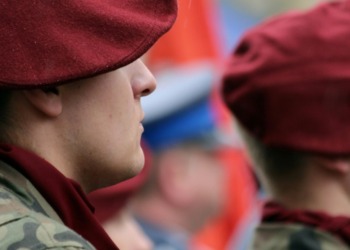Editor’s note: We are happy to present an insightful op-ed from an expert in European political nationalism, with a particular interest in Central and Eastern Europe in the 20th century and a close observer of the war in Ukraine. He makes the case that the war will impact the whole world and argues for more determined NATO action. It is particularly timely as Putin prepares for “Victory Day” celebrations tomorrow, a major national holiday in Russia marking the surrender of Nazi Germany and the end of World War II; many observers believe it could be an occasion for him to make a “declaration of war”, raising the stakes in the ongoing conflict.
We are now in the third month of Russia’s “special operation” in Ukraine and there is no sign of an end; meanwhile, the daily horror stories from the front have been replaced by national politics and local events, as the first items on the TV or radio news. Even the major European and American newspapers may now merely place a small paragraph on the front page with more detailed reports of the conflict only to be found on the inside.
Yet this war, because that is what it is, may shape not only our lives but those of hundreds of millions across the world, in a multitude of different ways, perhaps for years to come.
For the Russians, who according to the polls overwhelmingly support their despotic president, who has approval rating in excess of 80%, while even this “special operation” allegedly has the support of more than 60%, this is still perceived as a legitimate exercise, righting some wrong purportedly done to their country after the collapse of communism. Ever ready to consider their country a victim of a supposedly corrupt and immoral west, it has been relatively easy for Putin to convince the people that the West wants to impose its values and destroy the Russian nation, as he completes (in his own words) the task begun by Peter the Great.
For the West this is a fight for the maintenance of liberal democracy against the autocracies, represented for the moment by Russia but with an understanding that China will very possibly be a future adversary.
The West has pursued a policy of sanctions both against the Russian nation and Russians as individuals, embargoing Russian-owned businesses and confiscating privately owned assets, without any attempt at due process.
It is worth noting that Russia has not done the same in reprisal against foreign investments in Russia, nor has it seized the property of foreign businessmen working with Russian partners. As yet the sanctions have not really hit ordinary Russians as much as they have the “oligarchs”, who are considered Putin’s major supporters and whose foreign assets have been lost, perhaps forever.
Meanwhile, even the legitimate Russian businessmen, who worked with and trusted the West for decades, believing that they were protected by the rule of law, now find their livelihoods destroyed as the all-embracing sanctions hit indiscriminately.
The justification for the implementation of sanctions designed to punish Russian businessmen of whatever stripe is an entirely mistaken view that by making life miserable for the super-rich they will then pressure Putin to cease his Ukrainian campaign.
Impact on Russia
As the sanctions increase their bite, Putin will need to find a way to compensate the aspiring middle classes, who have enjoyed traveling to luxurious European resorts on summer and winter vacations, the material delights of which he now portrays as the fruits of a corrupt West.
He has even denounced his own citizens who, he complains “cannot get by without oysters and foie gras and so-called gender freedoms”, a strike at the Russian super-rich, who may now be targeted by their own government as well as the West.
In Moscow, Saint Petersburg and Yekaterinburg, the luxury boutiques are running out of stock, Apple Stores and Macdonalds have closed, French wines and Scotch whisky, fine china and Iphones are all becoming rarer or impossible to find.
Soon it will be more essential staples that will be gone, notably medicines, salt and sugar, while historic poor management in the agricultural sector has meant falling production of beef and failed attempts to boost the production of lamb to displace foreign imports, now banned by sanctions.
Russia, of course, remains a major producer of wheat so the people will not starve, but those who lived through the post-war Soviet era will have uncomfortable reminders of that period, a time whose ending Putin considered a “geopolitical catastrophe,” without imagining the deprivations suffered then might yet return.
Russian propaganda seems to have remained effective in disguising the truth of the conduct of the war, with unimaginable cruelties by these ordinary Russian sons, husbands and brothers, conscripted into their nation’s service, at least for the present.
Russian families are gradually learning of the loss of loved ones; once their lives have been forfeited in this pointless conflict there is little compensation in being told they died as heroes when their bodies lie in Ukrainian graves, without even the dignity of a military salute. State propaganda has proved remarkably effective in preventing independent western reports of the war from reaching the majority of the population and allegations of war crimes are dismissed as Ukrainian inventions.
Although any attempt to compute the numbers lost is met with a furious response, strong denials and threats of imprisonment, the reality of these losses cannot be disguised forever. The UN and the International Court of Justice investigations backed by satellite images, CCTV, forensic pathology reports, recordings of cell phone conversations and photos of mutilated bodies, along with eye-witness accounts, will make it more difficult to suppress what has been happening daily since the invasion began on the 24 February.
Russians have been led to believe that this “special operation” was to liberate their Ukrainian “brothers” from a Nazi regime, but this will be harder to believe when they see the near-total destruction of so many towns and cities, which Russians will know from holiday trips and where family members may have lived before the bombardment.
Impact on the West
Meanwhile, the developed world is suffering inflation with rising interest rates, higher energy and food costs and, even as people plan their summer holidays while finishing off the latest Netflix box sets, there is an increasing sense of unease at how this may end.
Putin’s most effective weapon against the west is not the artillery barrages directed at Ukrainian towns and cities, but the dread fear of the launch of a nuclear weapon that might reach London, Berlin, Milan, or Paris.
Putin has been boasting of the strength of his nuclear weapons ever since the occupation of Crimea in 2014 and, although a tactical strike might have been employed against Ukrainian forces in the east of their country, he has refrained from their use while leaving the vague threat of action floating in the ether.
His frequent references to Russia’s nuclear arsenal are proving a highly successful deterrent to direct NATO intervention – those member states opposing any further support for Ukraine on the grounds that Article 5 has not been triggered, conveniently forget that NATO intervened in the former Yugoslavia to prevent mutual genocide by Serbs, Croatian, or Kosovo Albanians, on the grounds of European security.
They also forget when condemning Russia for its seizure of Crimea and support for autonomy for Donetsk and Luhansk, that the West excised a portion of Serbia to create a new country, Kosovo, in obvious breach of the principle of the sanctity of borders established after the end of the Second World War. This newly invented country has certainly not remained a beacon of human rights and the arrest of its president for murder and the sale of body parts, is a particularly gruesome episode in modern Balkan history.
It is not difficult to argue, however, that the crisis in Ukraine carries a far higher risk to Europe and the west than the break-up of Yugoslavia.
Impact on the rest of the world
The developing world faces a far more uncertain future, however, as the three to four-fold rise in fertiliser prices hits local agricultural production, along with the loss of some 30% of the wheat exports that Russia and Ukraine usually provide to the world markets. This will be met with shortages of staple foods, starvation in some of the most benighted parts of Africa, civil disorder and increasing migration to Europe or North America.
How will the poorer but still by comparison hugely wealthy developed world respond to this?
For some political leaders, notably in Germany, Italy, Hungary, and even France, whose president made several wasted trips to sit at the end of a long table but achieved nothing, the immediate solution is an end to the war at whatever cost to Ukraine.
There are renewed calls for a cease-fire with Russia to be left in the same position it was in before the war started, and when it is pointed out that Putin needs a notional “victory” to justify this disastrous adventure, the proposition that Ukraine should give him the largely Russian speaking Donbas is suggested as a further “compromise”.
The extraordinarily courageous Ukrainians have made it abundantly clear that they now want victory, and for them, that means driving out the Russians altogether.
Russia’s tactical errors and next probable steps
It is impossible to predict with any certainty how or when this will end, but we may observe some of the same tactical errors made by Russia in its campaign in the east that led to the failure of its attempt to capture Kyiv.
The rush to unite the forces around Kherson with those in Mariupol has led to overstretched supply lines, slowing and even, in places, halting the Russian advances. This may be explained by the Russian commanders’ need to provide some tangible claim of success that can be announced by Putin on 9 May, as the Russian president has invested so much personal capital in the overall direction of the campaign rather than defer to the commanders on the ground.
Russia has already lost two lieutenant-generals and seven major-generals while the new overall commander, General Gerasimov, was slightly wounded in a recent attack on Belgorod military airport, demonstrating the effectiveness of Ukrainian intelligence at intercepting Russian military communications.
There is an internal Moscow campaign against those whose loyalty is suspected, with several senior officers from the 5th service of the FSB arrested or dismissed, while some officers of the general staff have been charged with embezzlement and several senior employees of Gazprom are alleged to have committed suicide after killing their families, almost certainly an FSB operation.
Another source reports rumours that Putin is soon to have an operation for cancer, with temporary command being given to Nikolai Patrushev, director of the Federal police security council. There have also been reports of some twenty fires or explosions at Russian fuel and weapons stores and while it is impossible to verify all these claims, the destruction of a railway bridge near Kursk, and an explosion at Kantemirovskaya tank division HQ near Moscow has been witnessed independently.
Together these reports have added to a sense of insecurity and dissatisfaction with the conduct of the war at the highest levels.
Russia’s armies on the ground are still superior in numbers, but since the start of hostilities of its pre-war build up along the Ukrainian border, it has lost 52% of its planes, 65% of its helicopters, 21% of its artillery, 63% of its tanks, and 61% of its armoured vehicles.
Precise numbers of soldiers killed or incapacitated are uncertain, but even conservative estimates would mean a per diem rate of deaths more than 20 times what Russia suffered in the war in Afghanistan, the last occasion on which Russian troops were engaged in any numbers.
Russia has reserves that can be drawn from other regions but it has unwisely initiated a further potential conflict in the Far East, by more directly asserting its claim to the Kuril Islands, which Japan also claims.
Taking into account the vast distances and the importance of maintaining defences along its thousands of miles of borders, Putin may be left with little option but to make a formal declaration of war on Ukraine, as that will allow him to extend conscription and call for a general mobilisation of reserves. It will also allow him to declare martial law, permitting him to nationalise key industries.
Although this will bring some immediate economic relief, he will lose the support of some of the most favoured oligarchs whose foreign holdings are already sanctioned, while legitimate businessmen will see there is little future for them without a change of regime.
Looking forward: Much will depend on NATO
All of this adds up to a likely continuation of the conflict unless NATO decides to confront Putin head-on.
The sanctions alone are not going to lead to a withdrawal and the decision to reduce and then eliminate purchasing Russian oil will be costly (and smaller EU countries will need to be given alternative sources); but Russia will find other markets, at a discount to the world market price – India and China would both be willing buyers.
It will be far easier for Russia to find a market for its oil, than for its surplus gas if Europe plucks up the courage to detach itself from this disastrous dependency.
Of the 199 bcm of gas that Russia exports, some 140 bcm has gone to Europe with just 30 bcm to China. While China would certainly provide a ready market at present, its own economy is suffering and even taking into account the ability of Chinese engineers to build at speed, the time to construct sufficient pipelines will not provide a short or medium-term solution to energy revenues.
It took five years to build the 1200 km Nordstream pipeline, which was not intended to carry the entirety of Europe’s imports, so even though pipelines to China would be over land, it is unlikely sufficient capacity could be built in less than three years.
NATO’s GDP is some 34 times that of Russia (before the invasion of Ukraine), and in every aspect of the military, it can claim considerable superiority, with largely professional armies rather than Russia’s poorly trained conscript forces, who have proved so inadequate recently.
While some key members of NATO would like to see a speedy settlement that would inevitably favour Russia, NATO must demonstrate its effectiveness, or lose its raison d’etre.
This is the test that it has been waiting for over the last seventy-three years since its foundation; a most unwelcome conflict but one which will determine whether the rest of the century will be the era of the liberal democracies or the time of autocrats, in which international disputes can only be settled by military conflict or intimidation.
A determined response will certainly deter Chinese adventurism and make an attack on Taiwan far less likely – meanwhile, the Chinese will already understand that any illegal military adventures may lead to an all-embracing sanctions regime that could wipe out their investments in the western economies. That this may also deter further Chinese investment in the West will be the price of a policy that has chosen to punish every business, legitimate or otherwise, on sometimes the flimsiest of grounds, the nationality of the owners.
There is a fear of a tactical nuclear response, but it is hard to see what Russia would achieve by such a dangerous move if NATO moved sufficient troops and armaments to the borders from Estonia through Poland, around Belarus to Slovakia and Romania (Hungary might refuse).
Turkey has a substantial fleet in the Black Sea and an enormous, but admittedly largely conscript army. Turkey already holds some NATO nuclear weapons while those in Belgium, Germany, Italy and the Netherlands could be moved closer. Britain and France are themselves nuclear powers but their missiles are carried in submarines, patrolling the oceans, hopefully undetected.
The moral and strategic justification for the possession of nuclear weapons should be for their use as a mutual deterrent – at present Russia is using them to deter NATO from intervening, which itself provides an incentive for every dictatorship across the world to acquire a modest nuclear arsenal.
What is clear is that as long as this war drags on, there can be no real engagement with Russia, yet this vast country holds extraordinary resources which are important for the prosperity of the entire planet.
How can an end to this conflict be achieved if not by demonstrating that NATO is ready to force a solution directly? Is it possible as long as Putin remains president and, if he is removed, will his successor merely be Putin mark II?
NATO should remember the Cuban missile crisis when the Unites States faced down Russia and a nuclear war was averted. This battle of wills was won by the determination of the US president, not retreat, and the same determination needs to guide NATO, a vastly larger organisation today than it was back then when Western and Soviet power seemed more balanced.
Reagan’s policies in the 1980s, combined with recognition by the Soviet leadership that it could no longer resist demands by the Eastern block countries for freedom from the iron grip of communism, succeeded in bringing about the political and economic collapse that led to perestroika.
In the early 1960s, no one seriously believed that the Soviet Union would have disappeared within 30 years and that a new Russian Federation would turn to capitalism and an elected government. If this transformation can happen again, the West must do everything to help the progress to democracy, and avoid any accusations that it is bent on humiliating Russia, as it is perceived to have done (at least by most Russians) after 1990.
Peace, and ultimately reconciliation, can only be achieved by a determined, united response, with at the same time a signal to Russia, and its potential future leaders, that the democracies are genuinely governed by a firm adherence to the rule of law and to the guarantees offered in the European Convention on Human Rights.
The West must make it clear that it would wholeheartedly support the advent of a democratic Russia but, at the same time, expect it to adhere to those same principles.
Editor’s Note: The opinions expressed here by Impakter.com columnists are their own, not those of Impakter.com. — In the Featured Photo: Protests in support of Ukraine, held on Feb.24 2022 Source: JBouchez wikimedia cc










